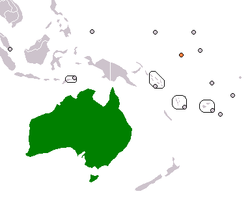Bilateral relations since Nauru's independence
In 1989, Nauru appealed against Australia to the International Court of Justice, due to the environmental devastation inflicted by phosphate mining during the colonial period. [2] In 1994, Australia agreed to settle the matter with Nauru out of court. The Australian Government agreed to pay Nauru A$57 million in compensation as well as A$50 million over the next 20 years. [1]
In 2001, bilateral relations were strengthened by an agreement known as the "Pacific Solution". Nauru agreed to host a detention centre for refugee applicants seeking asylum in Australia, in exchange for economic aid. This agreement came to an end in 2007, following the election of Kevin Rudd as Prime Minister of Australia, prompting Nauruan concerns about the future of the island's revenue. [3]
In March 2008, talks began between Australia and Nauru regarding the future of the former's economic development aid to the latter. Nauruan Foreign and Finance Minister Dr Kieren Keke stated that his country did not want aid handouts. One possible solution currently being explored would be for Australia to assist Nauru in setting up a "boat repair industry" for regional fishing vessels. [4] In July 2008, Australia pledged €17 million in aid for the following financial year, along with assistance for "a plan aimed at helping Nauru to survive without aid", according to ABC Radio Australia. [5]
On 9 December 2024, Australia and Nauru signed a joint security treaty which provided for Australia to provide Nauru with A$100 million (US$64 million) in direct aid over five years in exchange for Nauru consulting with Australia before signing any bilateral agreements with other countries. [6]
On 29 August 2025, Australia signed an agreement with Nauru allowing for the deportation of formerly detained people without valid Australian visas to the island in exchange for financial compensation of at least A$408 million. [7]
This page is based on this
Wikipedia article Text is available under the
CC BY-SA 4.0 license; additional terms may apply.
Images, videos and audio are available under their respective licenses.



